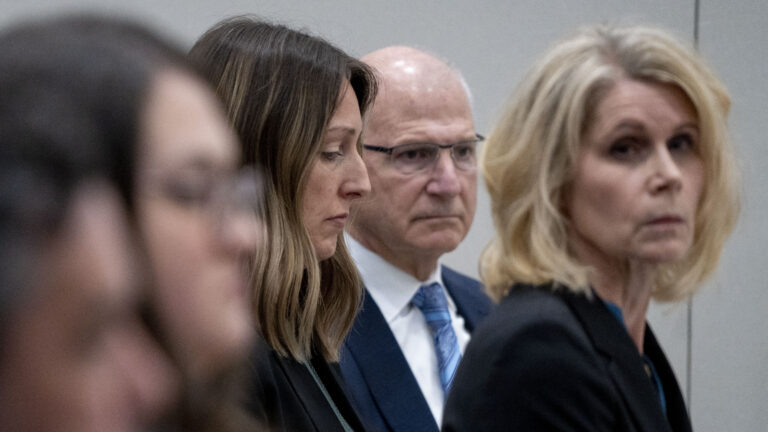
Physician Caitlin Bernard, left, sits between attorneys John Hoover and Alice Morical on May 25, 2023, before a hearing in front of the Indiana licensing board. Mykal McEldowney/The Indianapolis Star via AP
Last Thursday, after 15 hours of deliberation, the Indiana State Licensing board ruled that our friend and colleague Caitlin Bernard, an OB-GYN, violated patient privacy laws in discussing the case of a 10-year-old girl who traveled from Ohio for an abortion. She was given a letter of reprimand and a $3,000 fine.
While a relatively minor punishment, this finding should send a chill through the medical community and beyond. But that chill shouldn’t be silencing.
Statehouses across the country have increasingly demonstrated a willingness to pass laws that obstruct physicians’ ability to practice comprehensive, evidence-based medicine. From pandemic public health measures to reproductive rights to gender-affirming care, many states are putting politicians between patients and their physicians.
This enthusiasm for legislating medical care has laid bare the fact that physicians have a role and responsibility to be public advocates when evidence-based care comes under attack.
“Advocate” is often seen as a dirty word when referring to physicians, but it is actually an integral part of our professional responsibility. In fact, the American Medical Association Code of Ethics states that “physicians have an ethical responsibility to seek change when they believe the requirements of law or policy are contrary to the best interests of patients.” We have important expertise, knowledge, and experience and are obligated to ensure access to health care, resources, and evidence-based therapies — even if those health care decisions are unpopular to some.
Physicians see the political determinants of health and their direct effects on patients. Fighting for health equity means being an advocate for public health in political spaces. Speaking at rallies, testifying in legislative bodies, and giving interviews is our duty. This may lead to professional or personal repercussions, but we feel strongly that not using our privilege to speak out is far worse. Expecting change to happen without bearing some of the risk in helping to create that change is unrealistic.
This makes some uncomfortable. Politicians, community organizations, patients and even other clinicians may not expect to hear from physicians on these topics at these critical moments. But if physicians don’t stand up to protect patient decision-making, legislative bodies will continue to pass laws to limit care in ways that put individual and public health at risk. Indiana has a long history of passing abortion restrictions that are not based in evidence or patient-centered care and has recently moved to ban gender-affirming care, further removing medical decisions from patient’s hands. In many states, this puts us doctors in the agonizing position of having to choose between offering ethical, evidence-based care and care that is legal.
Caitlin Bernard has been persistently attacked over the past year for using her voice to advocate for reproductive health policies that are evidence-based and about which she has particular expertise. This precedent, of politicizing advocacy and using the medical licensing board for enforcement, leaves all doctors open to persecution by politicians who do not have medical training or an ethical obligation for advocacy. The licensing board’s ruling also seems to signal that the door has been opened to allow medical boards to be used to silence physician advocacy.
Make no mistake that this represents a threat to the medical profession and public health.
Last week’s ruling makes recruiting and retaining medical providers to our state even harder, a fundamental problem given our already prevalent health care access deserts.
There is not a clear path to combat this, but any solution will undoubtedly require more physicians to engage in the political and advocacy spaces, not less. We need more physicians to speak up, testify at statehouses, and run for office.
The four of us have been active in mobilizing physician advocacy in Indiana. In response to our state legislature ignoring science-based policy around public health measures, reproductive rights, and gun safety, we are part of a group that formed the Good Trouble Coalition in July 2022. Our goal is to educate and organize on issues of public health, patient-centered care, and health equity. We do this via statehouse-level advocacy by working with legislators to craft science-based health policy. With more than 1,200 members, we work to educate and empower Hoosier citizens and advocate for issues that matter to our communities and our patients to improve life in Indiana.

Add new comment